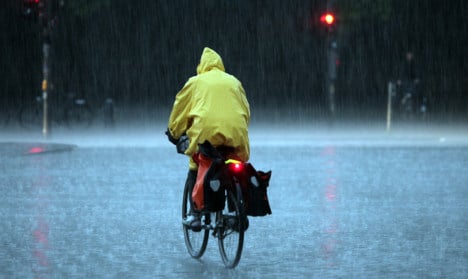A powerful storm front hit the northern port city about 5 pm, dumping 50 litres of rain per square metre, including hail stones. Thunder and lighting tore across the sky.
Streets and building basements were flooded and Hamburg U-Bahn entrances inundated.
One man was hospitalised after lighting struck close to where he was sitting in his office, daily Bild reported.
“He was sitting in his office on the seventh floor and a window was damaged by an electro-magnetic impulse,” a Hamburg fire department spokesman said.
More than 1,000 emergency services workers were deployed. The Hamburg fire department was called out 1,500 times in three hours. Normally they would be called out 630 times in a whole day.
“The whole city is affected. We are having a state of emergency,” the fire spokesman told Bild.
Click here to see pictures of the nasty weather
Parts of Hamburg’s main train station had to be closed as commuters waded through knee-deep water. Firemen were called out to the City Hall, the Interior Ministry and the US Consulate.
“There was water in basements all over the place,” the spokesman said.
The state opera house was also affected. Planes at Hamburg airport had to be grounded for about 30 minutes until the worst of the storm passed. Some S-Bahn train stations were closed for hours.
In Berlin, the fire department received about 80 call-outs in two hours, with the Mitte and Prenzlauer Berg districts especially hard hit by the torrential rain. Rain, hail and fierce squalls forced eight flights to divert from Tegel Airport in the northwest of the city to Schönefeld in the southeast.
The south of the country did not escape the brutal weather, with heavy rain and hail pounding parts of Bavaria in the districts of Kelheim, Landshut and Rottal-Inn.
Lightning caused several fires in the northeast of Germany. A 65-year-old woman in Neubrandenburg, Mecklenburg-Western Pomerania died after being hit by lightning.
And a herd of 30 deer were killed in a nature park in the northwestern state of North Rhine-Westphalia after a lightning bolt struck.
“They were completely roasted and had blue phosphor eyes,” said Albert Stobbe, the owner of the park in Mechernich. “Most of the animals were dead on the spot.”
Click here for The Local’s weather forecast
The Local/DPA/djw



 Please whitelist us to continue reading.
Please whitelist us to continue reading.
Member comments